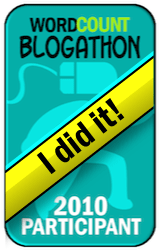I participated in a #journchat Twitter party yesterday afternoon, when the discussion evolved into a question about expected salaries for new journalists just out of college (Sidebar: My first salary equaled somewhere around $21K to edit a magazine, and this was back in the late 1980s).
But it was the first question that led to the tweet above -- upsetting to say the least. I'll tell you why.
The moderator started us off with: "If you could change one thing about your industry, what would it be?"
I said, "Wouldn't it be great to see an increase in pay? Especially from newspapers for freelance work."
To which one Britt Hysen (above), who writes for the GenYHub.com asked me what the average freelance pay is these days. I told her, "Newspapers may pay $100 for a 500-700 word story, more/less." But with magazines, I wrote, "it's getting difficult to get $1/word anymore."
That's not a good thing. Yet, from her response above, you can see she think it's a lot, which makes these numbers even worse.
Any long-time freelancer knows it's difficult to make a living as an independent journalist. You cannot do it writing for newspapers and magazines alone. Many of us find ways to diversify our experience. Maybe we write corporate newsletters, design websites, sell our photos, teach classes, offer social media to other business clients, and certainly we write books that will give us an "expert" status and hopefully higher pay, because -- and here's the clincher...
Just because you might get $1/word doesn't mean you're going to be assigned a lot of words to go with that rate. Writing a lot of words and making a lot of those dollars? That's not happening.
Where magazines used to run several long-form, narratives, they are now running shorter and shorter pieces. The "front of the book," as we call it, where all the shorts used to run, has expanded. There's now the middle of the book and the back of the book, and just a few lengthier features scattered in between. They're doing this why? You know, because readers no longer have attention spans. Technology has ruined us, we've been told. It's turning us all into victims of attention deficit disorder, or so the publishing industry would have us believe.
While I don't believe that's true -- I believe people crave full-length stories -- what I do believe is that the industry is just too cheap to pay for it, anymore. I have friends who have been writing for consumer magazines for many years, and they remember times when they were getting $4 or even $5 per every word they wrote. Now, Britt Hysen, that's a lot! That is where you could get very comfortable writing for magazines. You could actually even make a living as a magazine writer.
But these days, that's just not the case. The $1/word market used to be the minimum freelancers would strive to get. Today, we're very hopeful if we can get that. In fact, I generally don't even like to pitch magazines that pay less, because you just simply cannot pay your mortgage on .20/word. Think about it: How many words would you have to write to pay a $1,200 monthly mortgage? 6,000 words. You'd have to write 6,000 words every month just to make your mortgage. And you still haven't written enough to pay your utilities and have enough left over to eat something here and there.
That also means .20/word is not good. It's barely okay. But it is not good. It's not much better than those who would claim it's good to work for exposure. Again, that's a big N-O. Just keep in mind that "exposure" is the new "volunteer."
Also keep in mind that it is rare, rare, rare to get a 6,000-word assignment, anyway. So even the buck a word jobs wouldn't pay your mortgage -- unless you were assigned several -- because most editors are assigning jobs closer to the 500-word and less numbers. Or, they're simply paying a flat fee. I get a lot of those. $500 here. $300 there. When I recently took on a 2,400-word assignment, some of my writer friends were in awe. And so was I. I about died. And then I freaked because I was out of practice writing long-form journalism. As I said, it's assigned so rare these days. If it is, those plumb assignments go to the very regular writers that editors know well. Those of us who are not contributing writers for a specific market rarely see gems like that. So this was my happy dance moment.
But what's the takeaway? You might wonder: Why continue working in an industry that pays so poorly? What's the benefit?
We still get to choose the projects we take on. We still get to set our own hours. We get to work in piece, without office gossip. We get to enjoy a lot of freedoms working on our own. What we do not get is job security. We don't get that regular paycheck. Many of us don't have health insurance. We don't get sick days off. We work around the clock in many cases. And, really, our job is more selling than writing. But we get to choose whether we'll reel in the measly .20/word job or keep fishing for the higher-paying markets.
I choose to keep fishing, because even when I first started freelancing I knew .20/word was minimal, that it was not good. And I'll keep telling other writers that. Not because I don't think you should take the cheapo jobs. You should if you think it's worthwhile. But you should also stop fooling yourself into believing that low pay is good pay. It wasn't before the market fell apart, and it's still not now. If you can find a way to make it work for you, by all means, do it. But just don't continue to perpetuate a myth.
When all freelancers begin to stand up for higher pay -- because we work just as hard for the low-rent jobs as we do the higher-end jobs, and we work just as long, and we use the same skill sets and resources -- that's when we'll start to see rates increase to a more liveable rate.
Because don't forget: No one's in business to work for free, nor almost free. We're in business to make a living. And to make a living, you have to earn it. To earn it, you have to find clients that pay you what you're worth.
And I think you're worth more than .20/word. Don't you?













5 comments:
Thanks for a great discussion on freelancer rates. I live and work in Canada where the rates have historically been lower than the U.S. Canadian freelancers have been fighting long and hard to improve rates in a small market.
What really frosts me are those freelance bidding sites that are geared to really low rates and don't even get me started on "content mills."
Professionals can and should expect to be fairly compensated for their time time and expertise.
Yes, we writers absolutely need to be paid what we're worth. We must stop letting others undermine that worth. I know I've been guilty of it even with my books. I've given away way too much of my value over the years, and I'm beginning to realize that not only hurts me but all writers by perpetuating the myth you speak of. I vow to stop it right now... Thank you for writing and posting this.
This was a very good editorial. You have some excellent points throughout this- I've come across many writers who are floundering- these are writers who are GOOD writers- but they can't make ends meet with writing for magazines etc...because of exactly what you are saying!!
Preach it, sister!
Thanks for this, Jackie. I live and work in Canada, too, where I'm nowhere near making a living at it, but that is my goal. I've been writing for a content farm, and while it has been good experience, it doesn't pay the bills.
Post a Comment